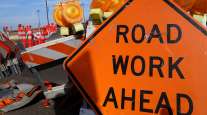Staff Reporter
Transportation Secretary Elaine Chao Addresses Autonomous Tech, Infrastructure at AASHTO Briefing

WASHINGTON — Widespread adoption of autonomous vehicle technologies depends largely on public trust, according to Transportation Secretary Elaine Chao.
Autonomous technology can take a variety of forms in transportation, from lane-departure warning systems and automated brakes to truck platooning. Automated technologies have, however, raised public concern over security and privacy.
Chao, who delivered remarks at the American Association of State Highway and Transportation Officials’ legislative meeting Feb. 27, said she has urged manufacturers and Silicon Valley technology leaders to educate consumers in an effort to dispel apprehensions.
“The promise of automated vehicles will never be realized if the public does not have confidence in the safety, security and privacy of these new emerging technologies,” Chao said. “It is even more important that automated vehicle manufacturers put safety first and embrace transparency, which will build consumer trust.”
"This is an exciting time for all of us to be working in the transportation sector." @SecElaineChao #AASHTOWB2019 pic.twitter.com/3BKwbdECHt — AASHTO (@aashtospeaks) February 27, 2019
Chao said the department’s approach to autonomous technologies emphasizes cooperation, collaboration and transparency. She said such technologies could improve safety, noting that 37,000 people died on America’s roads and highways in 2017.
Another priority for Chao is smoothing out the permitting process for road and bridge projects. She noted that too many construction projects are over budget and behind schedule. Chao discussed the benefits of the administration’s push to streamline the permitting and approval process through concurrent permitting review sessions among government agencies.
“The goal here is to make every dollar invested in infrastructure go further without compromising outcomes,” Chao said. “The status quo is not an option.”
Chao identified infrastructure as an issue that lawmakers from both sides of the aisle should be able to work together on. President Donald Trump’s proposed infrastructure package would rely significantly on nonfederal funds to reach $1.5 trillion over 10 years. Of that amount, $200 billion would come from federal funds.
Last year, Congress did not address Trump’s infrastructure proposal or retired Rep. Bill Shuster’s draft plan in which the Pennsylvania Republican proposed a fuel tax increase. The federal fuel tax has stagnated at 24.4 cents a gallon for diesel and 18.4 cents a gallon for gasoline since 1993.
Although a federal infrastructure package has yet to advance, Chao mentioned the success of several of DOT’s funding programs, including the Better Utilizing Investments to Leverage Development (BUILD) grants and the Infrastructure For Rebuilding America (INFRA) grants.
“It’s important to know significant investment in infrastructure is already taking place,” Chao said.
She told the crowd of state department of transportation leaders, many of whom are representing new gubernatorial administrations, that they offer an important voice. Several federal representatives, including Deputy Federal Highway Administrator Brandye Hendrickson and former Transportation Secretary Mary Peters, also attended the event. Chao encouraged the state leaders to collaborate with one another and consider DOT a partner.
“I want to let you know what a great journey you’re embarked upon. You’ll make friends for the remainder of your lives,” Chao said. “We want to help you build the infrastructure that you think best suits the needs of your communities.”



